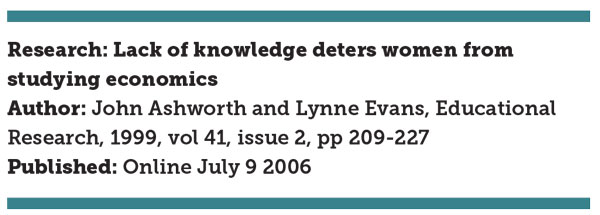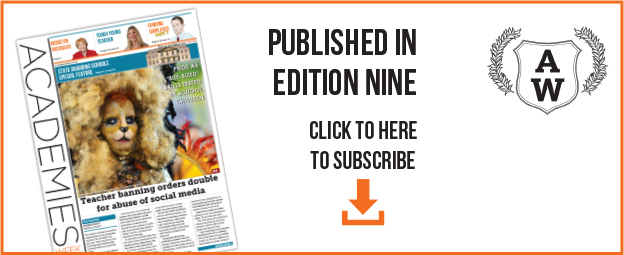
The proportion of female students studying economics A-level in the UK remains stubbornly low. But it was the marked decline in numbers taking the exam during the 1990s that triggered Ashworth and Evans’ research.
The pair surveyed 1,000 A-level students in 1996/7 across 35 schools, including all year 13 students studying economics and 767 students who were not.
Of those students studying economics A-level, females rated their interest in the subject at 3.72 on a scale of 1-5 whereas males rated it 3.56. Likewise, for those students studying economics but choosing not to take it at university, 55 per cent of females said that although they found it interesting, they performed better in their other subjects. This compared with 54 per cent of males.
Again, there was no significant difference, indicating that once taken, female students were no less likely to dislike the subject or perceive themselves to perform at a lower level compared with their other subjects.
The main difference came when analysing responses from students who had chosen not to study the subject at A-level. When asked why, the percentage of males who said that they knew nothing about the subject was 17 per cent compared with 31 per cent of female students: a significant difference.
The authors suggest that with more information, all students – and particularly females – may be more likely to take it. In addition to better information and a need for greater economics awareness in lower years at school, they also discuss introducing GCSE economics, re-examining the curriculum to consider how it might appeal more to females, and the importance of other females already studying economics in the school as potential levers for change.
As an economics teacher since 2004, I found this research interesting, first because of the trend data. I have seen increasing interest in the subject from both genders, particularly since things got interesting in the world economy in 2008.
Analysis by Geoff Riley of Tutor2U, who annually tracks the number of students studying economics from Joint Council for Qualifications (JCQ) data, reveals that there has been a significant change from the data reported in this 1999 paper, with an 87 per cent increase in the number studying the subject at AS and A2 since
2002, with 70,424 students sitting AS and A2-levels in 2014.
I took a closer look at the QCA data to identify any trends in gender uptake and although the numbers of male and female students have increased over this period, 58 per cent and 53 per cent respectively, the proportion of females remained consistently at 32 or 33 per cent each year, unchanged since Ashworth and Evans’ research. This suggests that, despite the subject’s increasing popularity, the question as to why more females don’t take it remains.
Like many other economics teachers I’m sure, I find that year 9 or 11 students consistently display misconceptions as to what the subject entails, be they male or female. Most consider it to be about money; few have an inkling that it centres on the allocation of scarce resources. I have wondered whether confidence may be at play here, that female students are more likely to admit their lack of knowledge.
GCSEs in economics or related subjects might reduce this knowledge gap. Likewise, PSHE or economics awareness programmes could do better at supporting knowledge of economics, rather than the typical diet of personal finance and budgeting. The suggestion of “feminising” the curriculum sits less well with me. I would be concerned that altering it on the chance that it might appeal to some female students would reduce the subject’s credibility for uncertain gains.
Overall, then, the economics A-level landscape has changed somewhat since Ashworth and Evans’ writing in 1999. However, although they are successful once they take up the subject, females still only make up a third of all students. Ashworth and Evans offer some sensible suggestions as to what work could be done to increase this proportion.













Your thoughts